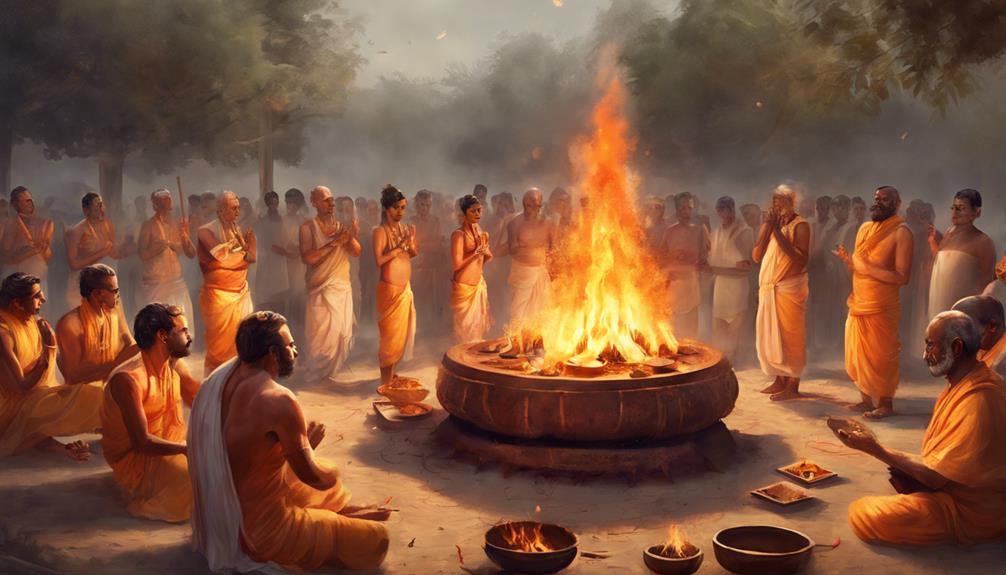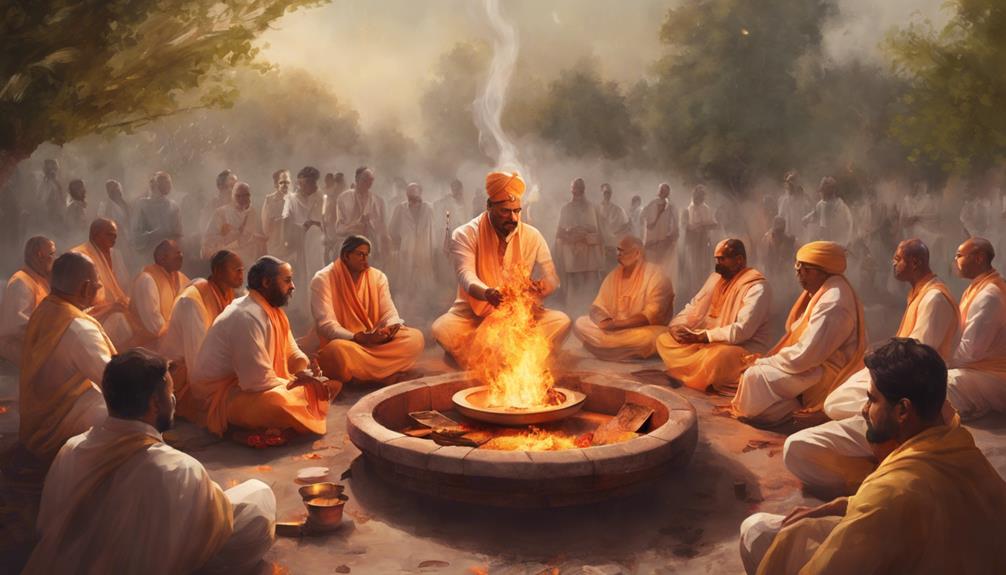In Hindu worship, Yagnas, or sacrificial fires, hold immense significance as they serve as a sacred conduit between you and the divine entities. Originating in ancient Vedic traditions, these rituals symbolize the interconnectedness between humans and the divine, maintaining cosmic order and harmony. By making offerings into the fire symbolizing both material and spiritual elements and chanting Vedic hymns, you seek to harmonize with cosmic rhythms and attract blessings from the deities.
Yagnas not only strengthen your personal relationship with the divine but also foster spiritual growth and enlightenment, aligning your consciousness with the universal order. The practice of Yagnas offers a profound journey into the heart of Hindu spirituality, revealing deeper connections and divine blessings.
Table of Contents
Key Takeaways
- Establish connection with deities through sacred offerings.
- Invoke blessings and positive energies from the divine.
- Surrender ego and material desires to foster spiritual growth.
- Align consciousness with cosmic order and universal energies.
- Strengthen personal relationship with Hindu gods.
Historical Origins of Yagnas
The ancient origins of Yagnas can be traced back to the Vedic period in Hindu history. These sacred rituals were an integral part of ancient practices and cultural traditions, symbolizing the connection between humans and the divine. Yagnas were elaborate ceremonies performed to honor and appease the gods, seeking their blessings for prosperity, peace, and protection.
During the Vedic period, Yagnas were considered essential for maintaining cosmic order and harmony. They were performed with utmost devotion and precision, following strict guidelines outlined in the sacred texts. The rituals involved intricate procedures, including the offering of various substances into the sacrificial fire while chanting Vedic hymns.
Yagnas served as a way to express gratitude to the deities and seek their favor in different aspects of life. The practice of Yagnas has been passed down through generations, preserving the rich heritage of Hindu culture. Even today, these ancient rituals continue to hold significance in Hindu worship, embodying the deep spiritual connection between humanity and the divine.
Symbolism and Rituals in Yagnas
In the intricate tapestry of Yagnas, symbolism intertwines with meticulously observed rituals, weaving a sacred connection between the earthly and the divine spheres. Each aspect of a Yagna holds profound symbolic representation, reflecting cosmic principles and spiritual truths. The fire, Agni, central to the Yagna, symbolizes transformation, purity, and the divine presence. The offerings made into the fire represent the material and spiritual elements that sustain life and symbolize the act of giving back to the universe.
The intricate ceremonies observed during a Yagna aren't mere actions but profound rituals that carry deep significance. The chanting of Vedic hymns resonates with cosmic vibrations, invoking blessings from the celestial spheres. The precise movements of the priests symbolize the cosmic order and the interconnectedness of all beings. Through these rituals, participants seek to harmonize their inner being with the cosmic rhythm, purifying their intentions and invoking divine blessings.
In the sacred space of a Yagna, where symbolism and rituals converge, participants experience a profound connection with the divine, transcending the boundaries of the material world.
Connection to Hindu Deities

Within the sacred domain of Hindu worship, one finds a profound and intricate network of connections to the divine deities. Deity worship lies at the heart of Hindu rituals, and Yagnas play a significant role in establishing and nurturing this connection. Through the performance of Yagnas, devotees offer sacred offerings to various gods and goddesses, invoking their presence and blessings.
In the ancient texts and scriptures of Hinduism, the importance of deity worship is emphasized as a means to establish a personal relationship with the divine. Yagnas serve as a conduit through which this relationship is strengthened and deepened. Each deity in Hinduism represents different aspects of the cosmos and existence, and by participating in Yagnas dedicated to specific deities, devotees seek to align themselves with these cosmic energies.
The sacred offerings made during Yagnas symbolize devotion, gratitude, and surrender to the divine. By presenting these offerings with sincerity and reverence, worshippers express their love and respect for the deities, fostering a spiritual connection that transcends the spiritual plane. Through the intricate rituals of Yagnas, devotees seek to experience the presence and grace of the divine in their lives.
Spiritual Benefits of Yagnas
Amidst the sacred rites of Hindu worship, the performance of Yagnas bestows profound spiritual benefits upon devotees. Engaging in Yagnas isn't merely a ritualistic act; it's a meditative practice that allows individuals to cultivate a deeper connection with the divine. Through the intricate process of conducting Yagnas, practitioners immerse themselves in a state of focused devotion, transcending the spiritual domain to reach a heightened spiritual awareness.
Yagnas are believed to attract divine blessings and positive energy, creating a harmonious environment that resonates with spiritual vibrations. The offering of oblations into the sacrificial fire symbolizes the surrender of the ego and material desires, paving the way for spiritual growth and enlightenment. The act of participating in a Yagna fosters a sense of unity with the cosmic forces and aligns the individual's consciousness with the universal order.
In essence, the spiritual benefits of Yagnas extend beyond the physical dimension, offering devotees an opportunity to deepen their spiritual practices and seek divine grace through ancient rituals that have stood the test of time.
Modern Relevance and Practice

The enduring significance of Yagnas in Hindu worship manifests in their modern relevance and continued practice as a means to connect with the divine and foster spiritual growth. Yagnas serve as a sacred platform for community gatherings, where individuals come together to participate in rituals, prayers, and offerings, fostering a sense of unity and collective spiritual energy. These gatherings not only strengthen social bonds but also provide a space for individuals to deepen their spiritual practice and devotion.
Furthermore, the practice of Yagnas holds modern relevance in its environmental impact. Traditional Yagnas are performed with a deep respect for nature, using natural elements such as ghee, grains, and herbs. The rituals emphasize harmony with the environment, promoting sustainability and reverence for the earth. In a world facing environmental challenges, the eco-friendly practices associated with Yagnas serve as a reminder of the interconnectedness between humanity and the natural world, offering a way to honor the divine while caring for the planet.
Frequently Asked Questions
Are There Different Types of Yagnas for Different Purposes or Deities?
In worship, varied yagnas exist for diverse goals and deities. Each type serves distinct purposes, aligning with specific spiritual aims or honoring particular gods. Their forms, rituals, and offerings contribute to the rich tapestry of Hindu worship.
How Does One Prepare for Participating in a Yagna Ceremony?
To prepare for a yagna ceremony, wear ritual attire with reverence. Purify your mind and body. Gather offerings with care and devotion. Approach the fire with humility and gratitude, ready to partake in the sacred ritual.
Can Yagnas Be Performed by Individuals at Home, or Are They Typically Done in a Temple or With a Priest?
Performing yagnas at home is significant for individual worship. While temple ceremonies with priests are traditional, home rituals allow personal connection and devotion. Both avenues hold importance in Hindu practices, offering diverse paths for spiritual growth.
Are There Specific Mantras or Hymns That Are Recited During Yagnas, and What Do They Signify?
During Yagnas, specific mantras and hymns are recited to invoke divine blessings. These sacred rituals, accompanied by offerings, symbolize devotion, gratitude, and the seeking of spiritual enlightenment. The mantras carry deep meanings, guiding worshippers towards harmony and divine connection.
Are There Any Restrictions or Guidelines on Who Can Participate in a Yagna Ceremony?
To participate in a yagna ceremony, you must meet specific eligibility criteria as per cultural traditions. Inclusivity is valued, yet adherence to participation rules is essential. Respect the guidelines, honoring the sacredness of the ritual.
Conclusion
To sum up, the significance of yagnas in worshipping Hindu gods is deeply ingrained in ancient traditions and symbolism. Through elaborate rituals and offerings, devotees seek to connect with the divine and receive spiritual blessings.
The practice of yagnas continues to hold importance in modern times, serving as a sacred way to honor and appease the deities. It's a potent means of spiritual growth and devotion in the Hindu tradition.